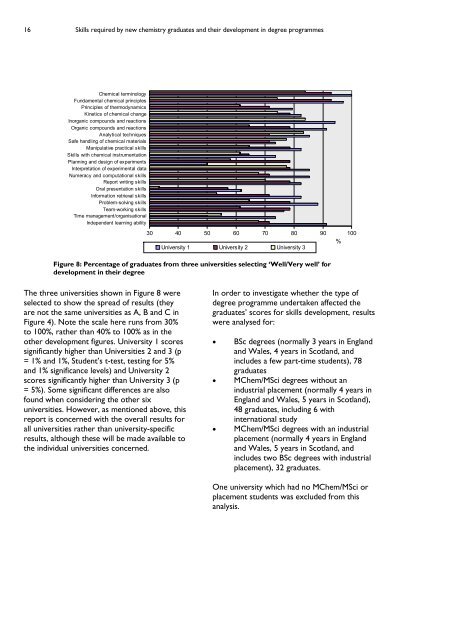Skills required by new chemistry graduates - Higher Education ...
Skills required by new chemistry graduates - Higher Education ...
Skills required by new chemistry graduates - Higher Education ...
Create successful ePaper yourself
Turn your PDF publications into a flip-book with our unique Google optimized e-Paper software.
16 <strong>Skills</strong> <strong>required</strong> <strong>by</strong> <strong>new</strong> <strong>chemistry</strong> <strong>graduates</strong> and their development in degree programmes<br />
Chemical terminology<br />
Fundamental chemical principles<br />
Principles of thermodynamics<br />
Kinetics of chemical change<br />
Inorganic compounds and reactions<br />
Organic compounds and reactions<br />
Analytical techniques<br />
Safe handling of chemical materials<br />
Manipulative practical skills<br />
<strong>Skills</strong> with chemical instrumentation<br />
Planning and design of experiments<br />
Interpretation of experimental data<br />
Numeracy and computational skills<br />
Report writing skills<br />
Oral presentation skills<br />
Information retrieval skills<br />
Problemsolving skills<br />
Teamworking skills<br />
Time management/organisational<br />
Independent learning ability<br />
30 40 50 60 70 80 90 100<br />
%<br />
University 1 University 2 University 3<br />
Figure 8: Percentage of <strong>graduates</strong> from three universities selecting ‘Well/Very well’ for<br />
development in their degree<br />
The three universities shown in Figure 8 were<br />
selected to show the spread of results (they<br />
are not the same universities as A, B and C in<br />
Figure 4). Note the scale here runs from 30%<br />
to 100%, rather than 40% to 100% as in the<br />
other development figures. University 1 scores<br />
significantly higher than Universities 2 and 3 (p<br />
= 1% and 1%, Student’s t-test, testing for 5%<br />
and 1% significance levels) and University 2<br />
scores significantly higher than University 3 (p<br />
= 5%). Some significant differences are also<br />
found when considering the other six<br />
universities. However, as mentioned above, this<br />
report is concerned with the overall results for<br />
all universities rather than university-specific<br />
results, although these will be made available to<br />
the individual universities concerned.<br />
In order to investigate whether the type of<br />
degree programme undertaken affected the<br />
<strong>graduates</strong>’ scores for skills development, results<br />
were analysed for:<br />
· BSc degrees (normally 3 years in England<br />
and Wales, 4 years in Scotland, and<br />
includes a few part-time students), 78<br />
<strong>graduates</strong><br />
· MChem/MSci degrees without an<br />
industrial placement (normally 4 years in<br />
England and Wales, 5 years in Scotland),<br />
48 <strong>graduates</strong>, including 6 with<br />
international study<br />
· MChem/MSci degrees with an industrial<br />
placement (normally 4 years in England<br />
and Wales, 5 years in Scotland, and<br />
includes two BSc degrees with industrial<br />
placement), 32 <strong>graduates</strong>.<br />
One university which had no MChem/MSci or<br />
placement students was excluded from this<br />
analysis.
















